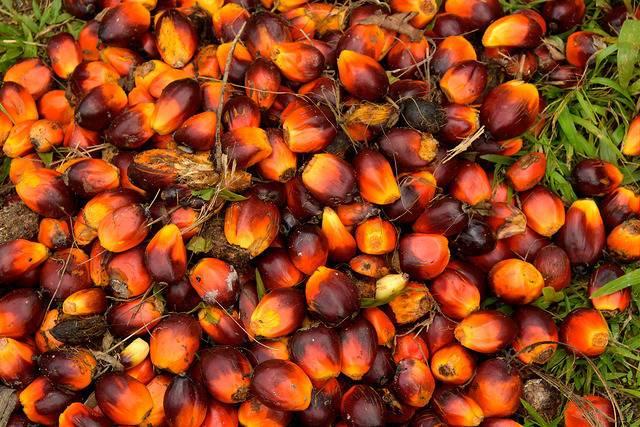
This week, Samsung introduced the Note 8 with much fanfare, only a year after the company endured a months-long public relationship nightmare due to exploding Note 7 smartphones. “A beast of a smartphone,” summed up one review on Wired.
At least one environmental group may agree with Samsung, but for a vastly different reason. According to NGO Mighty Earth, the Korea-based telecom is using proceeds from the sales of products such as the Note smartphones to develop palm oil plantations with some of the most notorious agribusiness interests in Indonesia.
One of those companies in particular, Korindo, has long been in Mighty’s cross-hairs. Korindo recently entered into an partnership with one of Samsung’s subsidiaries, Samsung SDS, to form a joint venture and compete within Indonesia’s logistics sector. Meanwhile, Mighty has accused Korindo of clearing 30,000 hectares of virgin rainforests, being responsible for at least 900 fires on land concessions dedicated to palm oil production and taking lands on which indigenous peoples have lived and worked without their consent.
Samsung’s relationship with Korindo comes as the latter has fomented protests in Indonesia and Korea over its ties to deforestation in regions such as Indonesia’s remote Papua province. To date, Korindo is not a member of the Roundtable on Responsible Palm Oil (RSPO), so the global sustainable palm oil governing board has no way to launch any punitive measures against the company. Some major palm oil suppliers that are members of RSPO, such as Wilmar, have ceased purchasing any palm oil from Korindo. And other suppliers reputed to source palm oil from areas subjected to deforestation have had difficulty finding buyers on the global market.
Despite some wins on the deforestation fight in Indonesia, Mighty says Samsung’s ties to Indonesia’s palm oil industry puts more virgin forests and local communities at risk. But while many companies continue to spurn Korindo over its business practices, “Samsung continues to financially prop it up,” in the words of a Mighty spokesperson during an email exchange with TriplePundit.
Mighty representatives recently met with Samsung Electronics executives in Seoul to make their case that the company should rethink such business relationships in Indonesia. Samsung’s executives told Mighty that they were only a 20 percent investor in Samsung SDS, the subsidiary partnering with Korindo. “We don’t think this is entirely true,” the Mighty spokesperson explained to 3p, “and regardless, that figure shows they have a lot of influence.”
Samsung representatives also told Mighty that Samsung SDS is an independent company; therefore, their corporate governance laws prohibit them from intervening in any Samsung SDS’s decisions. Mighty countered that as Samsung Electronics is a 20 percent shareholder of the company, it has leverage. The executives told Mighty’s representatives that they agreed to meet with Samsung SDS and suggested the subsidiary talk to Korindo and would keep the NGO updated. Mighty claims that Samsung SDS has not yet established any contact with the NGO, and Samsung SDS representatives have still issued any response to the organization’s letter.
Mighty has determined that some palm oil plantations in the island of Sumatra are owned by Samsung’ subsidiary Samsung C&T, which the company’s representatives insist is also a separate company from Samsung Electronics. Samsung C&T reportedly has shares in Samsung Electronics, but not the other way around. “We tried to convey that this is of material business interest to Samsung Electronics, given that consumers concerned about Samsung’s links to rainforest destruction and human rights abuse will not differentiate between the various Samsung companies,” said Mighty’s spokesperson.
Samsung affirmed these various companies are separate entities in a statement a spokesperson sent to 3p:
"We are not aware of any direct transactional business relationship between Samsung Electronics and Korindo. It is our understanding that a separate and independent Samsung company, Samsung SDS, has entered into an agreement with Korindo, which is at a very early stage at this time. Samsung Electronics does not operate or participate in Samsung SDS' day-to-day business. Samsung Electronics is fully committed to delivering innovative products that improve the world with the belief that the global community and the planet constitute our ultimate stakeholders."
In recent years, Samsung has found itself on both sides of deforestation controversies. The company says it has supported an environmental group in Brazil that strived to stop deforestation and protect indigenous communities in the Amazon region. But Samsung has also acknowledged that it had sourced tin from Indonesian mines that may have had ties to child labor and deforestation.
In the meantime, Mighty has enlisted the support of consumers to pressure Samsung to rethink its business relationships, by both an online petition campaign and social media. Mighty says that so far, 73,000 people have called on Samsung to cut their ties to Korindo.
Image credit: CIFOR/Flickr

Leon Kaye has written for 3p since 2010 and become executive editor in 2018. His previous work includes writing for the Guardian as well as other online and print publications. In addition, he's worked in sales executive roles within technology and financial research companies, as well as for a public relations firm, for which he consulted with one of the globe’s leading sustainability initiatives. Currently living in Central California, he’s traveled to 70-plus countries and has lived and worked in South Korea, the United Arab Emirates and Uruguay.
Leon’s an alum of Fresno State, the University of Maryland, Baltimore County and the University of Southern California's Marshall Business School. He enjoys traveling abroad as well as exploring California’s Central Coast and the Sierra Nevadas.














